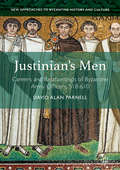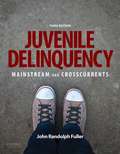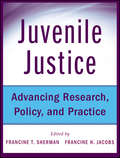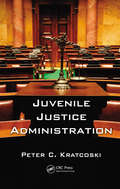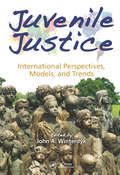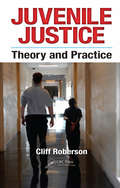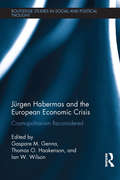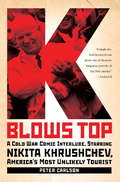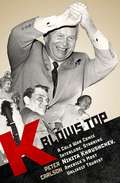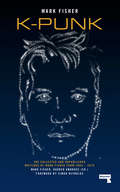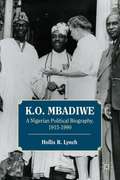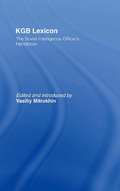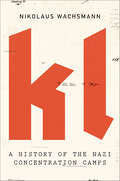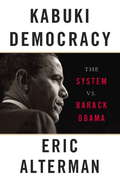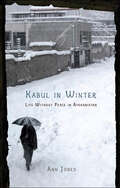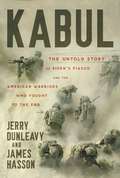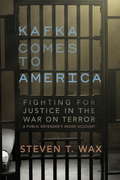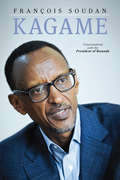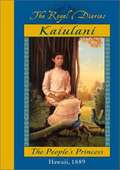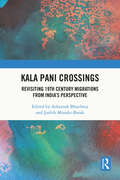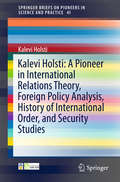- Table View
- List View
Justinian's Men: Careers and Relationships of Byzantine Army Officers, 518-610 (New Approaches to Byzantine History and Culture)
by David Alan ParnellThis book explores the professional and social lives of the soldiers who served in the army of the Byzantine Empire in the sixth century. More than just a fighting force, this army was the setting in which hundreds of thousands of men forged relationships and manoeuvred for promotion. The officers of this force, from famous generals like Belisarius and Narses to lesser-known men like Buzes and Artabanes, not only fought battles but also crafted social networks and cultivated their relationships with their emperor, fellow officers, families, and subordinate soldiers. Looming in the background were differences in identity, particularly between Romans and those they identified as barbarians. Drawing on numerical evidence and stories from sixth-century authors who understood the military, Justinian’s Men highlights a sixth-century Byzantine army that was vibrant, lively, and full of individuals working with and against each other.
Justitiabler Klimaschutz in Deutschland: Welchen Beitrag können Gerichte zum Klimaschutz leisten? (Schriftenreihe des Instituts für Klimaschutz, Energie und Mobilität)
by Michael KalisIn dieser Schrift wird aufbauend auf den Erkenntnissen der Climate Change Litigation und dem Phänomen der sog. Klimaklagen die Justitiabilität von Klimaschutz in Deutschland untersucht. Dabei wird der Untersuchungsgegenstand auf Klimaschutzklagen, d.h. auf vertikale Klagen von Privaten gegen den Staat mit dem Begehren auf verbesserte oder sonst adäquate Klimaschutzmaßnahmen, beschränkt. Nach einer Auseinandersetzung mit dem meist diffusen Begriff der Justitiabilität wird eine eigenständige Definition mit anschließendem Prüfungskanon entwickelt, der danach fragt, ob und inwieweit Klimaschutz vor deutschen Gerichten einklagbar ist; aber auch fragt, ob und inwieweit einschlägige Streitigkeiten zur gerichtlichen Klärung geeignet sind. Im Rahmen der Prüfung von Einklagbarkeit und Eignung werden die wesentlichen Herausforderungen der Klimaklagen identifiziert und – unter Berücksichtigung einschlägigen internationalen und europäischen Rechts – nach prozessualen und materiellen Verfassungsrecht geprüft. Unter Begründung eines subjektiven Rechts auf Klimaschutz im Sinne eines Schutzes der Freiheitsvoraussetzungen sowie unter Anwendung einer Abwägungsfehlerlehre als gerichtlicher Kontrollmaßstab wird die Justitiabilität von Klimaschutz in Deutschland bejaht. Dabei erfolgt – im deutschsprachigen Raum erstmals – eine monografische Auseinandersetzung mit dem sog. Klima-Beschluss des Bundesverfassungsgerichts.
Juvenile Delinquency: Mainstream and Crosscurrents
by John Randolph FullerOffering a highly analytical yet balanced approach, Juvenile Delinquency: Mainstream and Crosscurrents, Third Edition, encourages students to think critically about important real-world issues including the effects of inequality, race, class, and gender on juvenile delinquency and the juvenilejustice system. Lively, engaging, and accessible, it is ideal for juvenile delinquency courses in both criminal justice and sociology departments.
Juvenile Justice
by Francine T. Sherman Francine H. Jacobs"The lessons in this book remind us that we can-and that we must-do better, for the sake of our children, their futures, and the sake of our nation. . . . This volume is a call to action, and I encourage everyone who reads it to take steps to ensure that all America's children are given an equal chance to succeed. We must all work together to replace the cradle-to-prison pipeline with a pipeline to responsible, productive adulthood. " -From the Foreword by Marian Wright Edelman, JD, President and founder, Children's Defense Fund, Washington, DC "Juvenile Justice: Advancing Research, Policy, and Practice appears at a critical time, when promising juvenile justice reforms are underway in so many jurisdictions across the United States. Sherman and Jacobs, and their impressive array of expert authors, fill a significant gap in the literature, making the current body of juvenile justice research and experience accessible to policy makers, researchers, and funders, and doing so through a practical and positive lens. " -Patrick McCarthy, President and Chief Executive Officer, Annie E. Casey Foundation, Baltimore, MD "Most people have narrow views of what it means to be a delinquent youth. In Juvenile Justice: Advancing Research, Policy, and Practice, Sherman and Jacobs have diligently collected essays from the top experts in the juvenile justice field who tell an empirically based and powerful narrative of who is really in the delinquency system. As this book makes clear, until we ask and answer the right questions, we will remain unable to help the youth most in need. " -Alexander Busansky, President, The National Council on Crime and Delinquency, Oakland, CA A comprehensive reference presenting a rehabilitative, youth- and community-centered vision of juvenile justice Juvenile Justice: Advancing Research, Policy, and Practice brings together experts in juvenile justice, child development, and public health to explore the intersections between juvenile justice and needed development of programs and policies that look out for the health and well-being of the youth who enter this system. This timely book provides a usable framework for imagining juvenile justice systems that emphasize the welfare of juveniles, achieved primarily through connections within their communities. A must-read for professionals working in juvenile courts and within juvenile justice agencies, Juvenile Justice: Advancing Research, Policy, and Practice reflects both the considerable advances and the challenges currently evident in the juvenile justice system, with an emphasis on the development and implementation of policies that can succeed in building a new generation of educated young people able to embrace their potential and build successful futures.
Juvenile Justice Administration
by Peter C. KratcoskiAn effective administrator must not only have the educational background to understand the foundational basis for the system, but must also be guided by the vision and mission of the organization. Juvenile Justice Administration illustrates through examples and interviews with juvenile justice administrators and other personnel how these organizati
Juvenile Justice: International Perspectives, Models and Trends
by John A. WinterdykJuvenile justice has been and remains a topical issue at national and international levels. There are various standards and guidelines for administration, but six major models characterize juvenile justice systems worldwide: participatory, welfare, corporatism, modified justice, justice, and crime control. Juvenile Justice: International Perspectiv
Juvenile Justice: Theory and Practice
by Cliff RobersonOver several hundred years, the juvenile justice system has evolved from one in which a child offender was prosecuted under the same guidelines used for adults to the current system in which society has recognized the unique status of juveniles within the criminal justice framework. Written by world-renowned legal scholar Cliff Roberson, Juvenile J
Jürgen Habermas and the European Economic Crisis: Cosmopolitanism Reconsidered (Routledge Studies in Social and Political Thought)
by Gaspare M. Genna Thomas O. Haakenson Ian W. WilsonThe European Union entered into an economic crisis in late 2009 that was sparked by bank bailouts and led to large, unsustainable, sovereign debt. The crisis was European in scale, but hit some countries in the Eurozone harder than others. Despite the plethora of writings devoted to the economic crisis in Europe, present understandings of how the political decisions would influence the integration project continue to remain vague. What does it actually mean to be European? Is Europe still a collection of peoples that rallied together during good times and then retreat to nationalism when challenges appear? Or has Europe adopted a common identity that would foster solidarity during hard times? This book provides its reader with a fresh perspective on the importance identity has on the functioning of the European Union as exemplified in Jürgen Habermas’ seminal text, ‘The Crisis of the European Union: A Response’. Rather than exploring the causes of the crisis, the contributors examine the current state of European identity to determine the likelihood of implementing Habermas’ suggestions. The contributor’s interdisciplinary approach is organized into four parts and examines the following key areas of concern: Habermas’ arguments, placing them into their historical context. To which degree do Europeans share the ideals Habermas describes as crucial to his program of reform. Influence of Habermas’ cosmopolitanism through religious and literary lenses. Impact of Habermas’ notions in the arenas of education, national economies, austerity, and human rights. Jürgen Habermas and the European Economic Crisis will be read by scholars in the fields of Political Theory and Philosophy, European Politics and Cultural Studies.
K Blows Top: A Cold War Comic Interlude Starring Nikita Khrushchev, America's Most Unlikely Tourist
by Peter CarlsonKhrushchev’s 1959 trip across America was one of the strangest exercises in international diplomacy ever conducted-"a surreal extravaganza,” as historian John Lewis Gaddis called it. Khrushchev told jokes, threw tantrums, sparked a riot in a San Francisco supermarket, wowed the coeds in a home economics class in Iowa, and ogled Shirley MacLaine as she filmed a dance scene in Can-Can. He befriended and offended a cast of characters including Nelson Rockefeller, Richard Nixon, Eleanor Roosevelt, Elizabeth Taylor, and Marilyn Monroe. Published for the fiftieth anniversary of the trip,K Blows Topis a work of history that reads like a Vonnegut novel. This cantankerous communist’s road trip took place against the backdrop of the fifties in capitalist America, with the shadow of the hydrogen bomb hanging over his visit like the Sword of Damocles. As Khrushchev kept reminding people, he was a hot-tempered man who possessed the power to incinerate America.
K Blows Top: A Cold War Comic Interlude, Starring Nikita Khrushchev, America's Most Unlikely Tourist
by Peter CarlsonThis hilarious account of Khrushchev's 1959 U. S. tour is also a supremely entertaining evocation of the history and atmosphere of Cold War America.
K-punk: The Collected and Unpublished Writings of Mark Fisher
by Mark Fisher Simon Reynolds Darren AmbroseA comprehensive collection of the writings of Mark Fisher (1968-2017), whose work defined critical writing for a generation.This comprehensive collection brings together the work of acclaimed blogger, writer, political activist and lecturer Mark Fisher (aka k-punk). Covering the period 2004 - 2016, the collection will include some of the best writings from his seminal blog k-punk; a selection of his brilliantly insightful film, television and music reviews; his key writings on politics, activism, precarity, hauntology, mental health and popular modernism for numerous websites and magazines; his final unfinished introduction to his planned work on "Acid Communism"; and a number of important interviews from the last decade. Edited by Darren Ambrose and with a foreword by Simon Reynolds.
K. O. Mbadiwe
by Hollis R. LynchThis book offers a comprehensive political biography of Kingsley Ozuomba Mbadiwe, (1915-1990), a central figure in Nigerian political history for more than forty years. Starting in 1936 as a prot#65533;g#65533; of Nnamdi Azikiwe, then Nigeria's most renowned nationalist, Mbadiwe himself by the 1950s became a frontline nationalist. And next to Tafawa Balewa from the North who became Prime Minster in 1957, he was the most important figure in the Nigerian Federal Government between 1952 and Nigeria's first military coup in 1966. During this time he held a succession of important Cabinet positions and was Parliamentary Leader of the National Council of Nigeria and the Cameroons (NCNC), which was in a ruling alliance with the Northern People's Congress (NPC). In contrast, his older prominent political contemporaries, Azikiwe of the Eastern Region, Igbo Leader of the NCNC; Obafemi Awolowo of the Western Region, Yoruba Leader of the Action Group (AG); and Ahmadu Bello of the Northern Region, Fulani Leader of the NPC, all carved out their political careers totally or largely at the regional level. Throughout his political career Mbadiwe's focus was always at the national level. Truly, it has been stated that Mbadiwe was one of the founding fathers of the Nigerian State. Nonetheless, Mbadiwe's ambition for himself to lead Nigeria and for his nation to set it on the path to greatness faced insuperable difficulties. In a country of widespread poverty, high illiteracy, and a grossly underdeveloped private sector, there were fierce ethnic and regional conflicts for the control of governments and resources, leading to massive corruption and serious instability. This in turn led to prolonged military rule twenty years in Mbadiwe's lifetime which was often more corrupt and repressive than civilian rule, and was bitterly deprecated by Mbadiwe.
KGB Lexicon: The Soviet Intelligence Officers Handbook
by Vasili MitrokhinIn this volume Mitrokhin presents two dictionaries produced by the KGB itself to define their activities in both offensive and defensive intelligence work. The translated documents tell the story of the KGB's methods and targets and should interest the general public as well as the specialist.
KGB: The Inside Story of Its Foreign Operations from Lenin to Gorbachev
by Christopher Andrew Oleg GordievskyThis book tells the history of the KGB from Lenin to Mikhail Gorbachev. It's a collaboration between a veteran of the CIA and a journalist. They uncover the inside story of the CIA-KGB spy wars.
KIRCHNER Y YO (EBOOK)
by Fernando IglesiasCon osadía y respeto institucional, Fernando Iglesias crea un relato sui generis que invade distintos géneros (carta personal, diatriba, libelo) para contar una relación #polémica, conflictiva# con el presidente que nos gobierna desde hace cuatro años. Queda claro desde el comienzo que esa relación, planteada sin inhibiciones ni ambages, dice no perdonarle al presidente Kirchner ninguna de sus actitudes y conductas, que Iglesias ejemplifica en la falta de respeto (institucional, entre otras), la imprecisión ideológica, la hipocresía, el sentimentalismo. El resultado, sin embargo, no es un lamento personal, recalcitrante y falto de argumentación, sino un ensayo contemporáneo decidido y pasional, completo y despiadado sobre lo que para el autor es la práctica, el uso y el abuso del poder, y sobre el modo en que lo observa #o según él lo soporta, lo padece# el ciudadano común. En una síntesis asombrosa de capacidad de observación y capacidad de análisis, el autor consigna, con datos y cifras, un punto de vista que debemos tener presente cuando confrontamos este gobierno con los anteriores y, sobre todo, con la década menemista. El libro que la actualidad #y la historia seguramente# exige leer.
KL: A History of the Nazi Concentration Camps
by Nikolaus WachsmannThe “deeply researched, groundbreaking” first comprehensive history of the Nazi concentration camps (Adam Kirsch, The New Yorker).In a landmark work of history, Nikolaus Wachsmann offers an unprecedented, integrated account of the Nazi concentration camps from their inception in 1933 through their demise, seventy years ago, in the spring of 1945. The Third Reich has been studied in more depth than virtually any other period in history, and yet until now there has been no history of the camp system that tells the full story of its broad development and the everyday experiences of its inhabitants, both perpetrators and victims, and all those living in what Primo Levi called “the gray zone.”In KL, Wachsmann fills this glaring gap in our understanding. He not only synthesizes a new generation of scholarly work, much of it untranslated and unknown outside of Germany, but also presents startling revelations, based on many years of archival research, about the functioning and scope of the camp system. Closely examining life and death inside the camps, and adopting a wider lens to show how the camp system was shaped by changing political, legal, social, economic, and military forces, Wachsmann produces a unified picture of the Nazi regime and its camps that we have never seen before.A boldly ambitious work of deep importance, KL is destined to be a classic in the history of the twentieth century.Praise for KLA Wall Street Journal Best Book of 2015A Kirkus Reviews Best History Book of 2015Finalist for the National Jewish Book Award in the Holocaust category“[A] monumental study . . . a work of prodigious scholarship . . . with agonizing human texture and extraordinary detail . . . Wachsmann makes the unimaginable palpable. That is his great achievement.” —Roger Cohen, The New York Times Book Review“Wachsmann’s meticulously detailed history is essential for many reasons, not the least of which is his careful documentation of Nazi Germany’s descent from greater to even greater madness. To the persistent question, “How did it happen?,” Wachsmann supplies voluminous answers.” —Earl Pike, The Plain Dealer (Cleveland)
Kabuki Democracy: The System vs. Barack Obama
by Eric AltermanIn this “agenda-setting” polemic, journalist and historian Eric Alterman explains what is really happening with the Obama presidency. While Obama’s many compromises have disappointed liberals, Alterman argues that these concessions are largely due to a political system that is rigged against progressive change. These structural impediments to democracy have made the keeping of Obama’s campaign promises all but impossible. Brilliantly blending incisive political analysis with a clear agenda for change,Kabuki Democracycuts through the clichés of conservative propaganda and lazy mainstream media analysis to demonstrate that genuine “change” will come to America only when people care enough to challenge the system.
Kabul in Winter: Life Without Peace in Afghanistan
by Ann JonesA sharp and arresting people's-eye view of real life in Afghanistan after the Taliban Soon after the bombing of Kabul ceased, award-winning journalist and women's rights activist Ann Jones set out for the shattered city, determined to bring help where her country had brought destruction. Here is her trenchant report from inside a city struggling to rise from the ruins. Working among the multitude of impoverished war widows, retraining Kabul's long-silenced English teachers, and investigating the city's prison for women, Jones enters a large community of female outcasts: runaway child brides, pariah prostitutes, cast-off wives, victims of rape. In the streets and markets, she hears the Afghan view of the supposed benefits brought by the fall of the Taliban, and learns that regarding women as less than human is the norm, not the aberration of one conspicuously repressive regime. Jones confronts the ways in which Afghan education, culture, and politics have repeatedly been hijacked—by Communists, Islamic fundamentalists, and the Western free marketeers—always with disastrous results. And she reveals, through small events, the big disjunctions: between U.S promises and performance, between the new "democracy" and the still-entrenched warlords, between what's boasted of and what is. At once angry, profound, and starkly beautiful, Kabul in Winter brings alive the people and day-to-day life of a place whose future depends so much upon our own.
Kabul: The Untold Story of Biden's Fiasco and the American Warriors Who Fought to the End
by James Hasson Jerry DunleavyThis explosive national bestseller is the definitive account of the Biden administration's most disgraceful hour—and the chaos it unleashed in the world. America&’s chaotic retreat from Afghanistan in 2021 was nothing short of a horror show. Women and children were trampled to death outside the gates of the Kabul airfield. Desperate Afghans fell from the landing gear of departing planes. Taliban fighters mercilessly whipped and humiliated U.S. civilians trying to access the few square miles still controlled by American forces. Countless Afghan interpreters were abandoned to the mercy of the Taliban after risking their lives alongside American troops for years. And thirteen U.S. service members—eleven of whom were still in preschool on 9/11—were murdered in an ISIS suicide bombing that could easily have been prevented. Still, the full story is worse than anyone imagined. Drawing from hundreds of hours of first-person interviews, investigative reporter Jerry Dunleavy and former Army Captain and Afghanistan veteran James Hasson provide an exclusive, no-holds-barred account of the disastrous events of August 2021. Kabul is packed with shocking and infuriating exclusive details about fatal politics and bureaucracy that contributed to the catastrophe. The authors also tell, for the first time, inspiring stories of the bravery and sacrifices exhibited by countless Americans on the ground. Kabul's original reporting includes eyewitness accounts from servicemembers of all ranks who participated the rescue effort, inside information from senior intelligence officials, interviews with high-ranking members of allied governments, harrowing stories from Americans and Afghan allies willfully abandoned by craven officials in Washington, and exclusive details about veteran-led rescue missions that continue to this day. Chapter after chapter, Kabul depicts American government at its worst and &“ordinary&” Americans at their best. Ultimately, this book explains how Biden&’s Afghanistan retreat spurred a dangerous new era that persist for decades. While Americans watched the fall of Afghanistan with disbelief, our nation&’s enemies were also paying close attention.
Kafka Comes to America
by Steven T. WaxAmerican Bar Association Silver Gavel Award -- Winner in the Book categoryIndependent Publishers -- Winner of the Gold Medal in the Autobiography/Memoir category ForeWord Book of the Year Awards -- Winner of the Bronze Medal in the Social Science category The Eric Hoffer Award - Winner in the Memoir categoryA public defender's dedicated struggle to rescue two innocent men from the recent Kafkaesque practices of our vandalized justice system"Our government can make you disappear." Those were the words Steven Wax never imagined he would hear himself say. In his twenty-nine years as a public defender, Wax had never had to warn a client that he or she might be taken away to a military brig, or worse, a "black site," one of our country's dreaded secret prisons. How had our country come to this? The disappearance of people happens in places ruled by tyrants, military juntas, fascist strongmen--governments with such contempt for the rule of law that they strip their citizens of all rights. But in America?Under the current Bush administration, not only are the civil rights of foreigners in jeopardy, but those of U.S. citizens. Wax interweaves the stories of two men that he and his team represented: Brandon Mayfield, an American-born small town lawyer and family man, arrested as a suspected terrorist in the Madrid train station bombings after a fingerprint was incorrectly traced back to him by the FBI; and Adel Hamad, a Sudanese hospital administrator taken from his apartment to a Pakistani prison and then flown in chains to the United States military prison in Guantanamo Bay, Cuba. Kafka Comes to America reveals where and how our civil liberties have been eroded for a false security, and how each of us can make a difference. If these events could happen to Brandon Mayfield and Adel Hamad, they can happen to anyone. It could happen to us. It could happen to you.
Kagame
by François SoudanBill Gates, Bill Clinton, Tony Blair, Ben Affleck, Natalie Portman, the CEOs of Starbucks and Visa, Howard G. Buffett, Robert de Niro, Susan Rice, Don Cheadle, and many other celebrities are amongst his most fervent admirers. For them, Paul Kagame is the man who produced the Rwandan Miracle. The one who was able to make a people and a nation rise from the ashes of the last genocide of the twentieth century. But this former refugee, once a warlord by necessity, who then became the president of a country that he endeavors to lead down the path of economic emergence with an iron hand, also has fierce enemies who consider him to be a sort of African Machiavelli. His opponents, human rights organizations in particular, criticize him for favoring development over democracy. Saint or demon, virtuous liberator or dictator: rarely has a head of state been as controversial as he. Twenty years after the genocide of the Tutsis from Rwanda, causing one million deaths in one hundred days in the Land of a Thousand Hills, Paul Kagame candidly reveals himself for the very first time.François Soudan is the managing editor of Jeune Afrique, a leading news weekly based in Paris, and has authored biographies of Nelson Mandela and Muammar el-Qaddafi. Soudan has traveled to Rwanda on numerous occasions over the past twenty years. His interviews with Paul Kagame took place in Kigali between December 2013 and March 2014.
Kaiserin Mathilde, Herrin der Engländer
by Laurel A. Rockefeller Christina LöwDie brüllende Löwin von England! Geboren 1102 als Tochter von König Henry von England und Königin Matilda von Schottland, war Matildas einzigartige Abstammung von normannischem, sächsischem und schottischem Adel dazu gedacht, das England zu einen, das immer noch durch den Eroberungszug ihres Großvaters im Jahr 1066 geteilt war. Als das Schiffsunglück von 1120 sie zum einzigen überlebenden Kind ihrer Eltern machte, wurde Matilda plötzlich zur Erbin des englischen Throns, in einer Zeit, in der der Witan – und nicht der Wille des Königs – über die Thronfolge entschied. Entdecken Sie die wahre Geschichte der ersten Frau, die aus eigenem Geburtsrecht ihren Anspruch auf den Thron geltend machte, und lassen Sie sich inspirieren! Enthält auch Matildas Stammbaum, eine detaillierte Zeitleiste sowie Leseempfehlungen, sodass Sie weitere Möglichkeiten haben, sich weiterzubilden.
Kaiulani: The People's Princess (The Royal Diaries)
by Ellen Emerson WhiteMay 6, 1889<P>At Iolani Palace, Father and I met with Papa Moi and Mama Moi in the throne room. Papa Moi was solemn as he reminded me that it will be my responsibility to do as well as possible, and in that way, further the hopes of our nation. I was glad that I have never admitted to him how fearful I am about leaving. I think he would find that petty, as I go off not for myself, but for all of the Hawaiians I will someday lead.<P>"I will not fail, Papa, will I?" I asked Father, once we were in our carriage and on the way back to Ainahau.<P>"It is not even a possibility", he said, his voice full of confidence.<P" wish that I could feel that same confidence.
Kala Pani Crossings: Revisiting 19th Century Migrations from India’s Perspective
by Judith Misrahi-Barak Ashutosh BhardwajWhen used in India, the term Kala pani refers to the cellular jail in Port Blair, where the British colonisers sent a select category of freedom fighters. In the diaspora it refers to the transoceanic migration of indentured labour from India to plantation colonies across the globe from the mid-19th century onwards. This volume discusses the legacies of indenture in the Caribbean, Reunion, Mauritius, and Fiji, and how they still imbue our present. More importantly, it draws attention to India and raises new questions: doesn’t one need, at some stage, to wonder why this forgotten chapter of Indian history needs to be retrieved? How is it that this history is better known outside India than in India itself? What are the advantages of shining a torch onto a history that was made invisible? Why have the tribulations of the old diaspora been swept under the carpet at a time when the successes of the new diaspora have been foregrounded? What do we stand to gain from resurrecting these histories in the early 21st century and from shifting our perspectives? A key volume on Indian diaspora, modern history, indentured labour, and the legacy of indentureship, this co-edited collection of essays examines these questions largely through the frame of important works of literature and cinema, folk songs, and oral tales, making it an artistic enquiry of the past and of the present. It will be of great interest to scholars and researchers of world history, especially labour history, literature, postcolonial studies, cultural studies, diaspora studies, sociology and social anthropology, Indian Ocean studies, and South Asian studies.
Kalevi Holsti: A Pioneer in International Relations Theory, Foreign Policy Analysis, History of International Order, and Security Studies
by Kalevi HolstiIn honour of Prof. Kalevi Holsti's 80th birthday, this collection presents 15 of the renowned Political Scientist's major essays and research projects. It also offers a collection of his writings and essays on theories of international relations, foreign policy analysis, security and the world order. These previously published works address issues that remain "hot topics" on the international agenda, such as the changing nature of warfare and the causes of failed states; major essays also evaluate the current search for international order. Prof. Holsti is the author of a major textbook that has been translated into Mandarin, Korean, Japanese, and Bahasa Indonesian. Thousands of undergraduates around the world are acquainted with his work.
